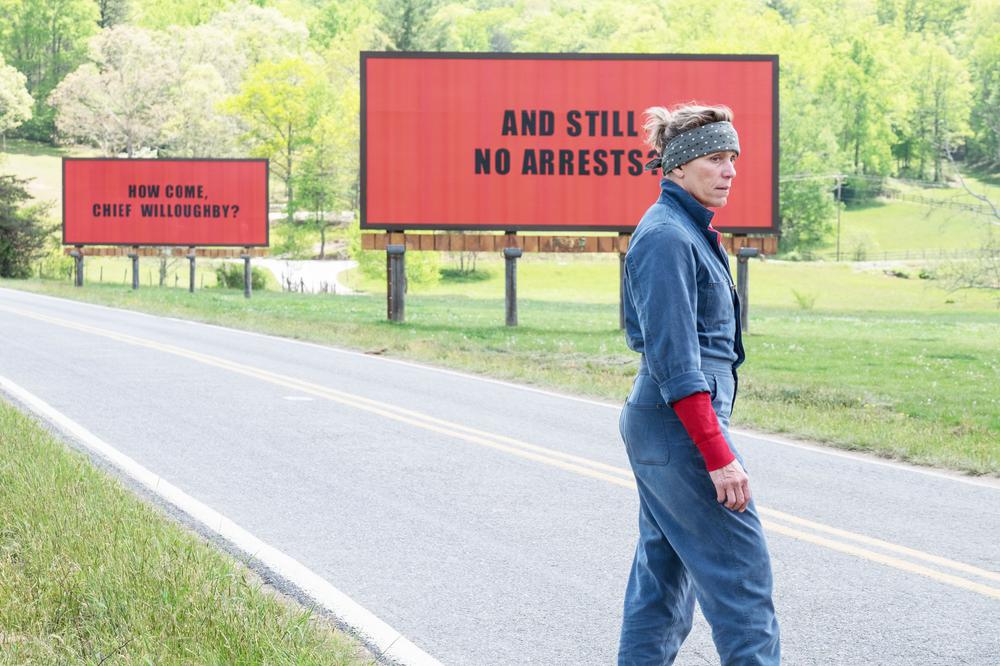A heartbroken cop mourns the loss of a friend by throwing a man out of a window. A grief-stricken mom vents about her daughter's death by hurling Molotov cocktails at the local police station. And a terminally ill man gives his loving family bear hugs goodnight, before shooting himself in the head.
In Martin McDonagh's Three Billboards Outside Ebbing, Missouri, sentimentality and violence walk hand in hand. What starts out as grief, frustration, confusion and guilt inevitably morphs into the most visceral and grotesque of actions. And yet, buried within such angry folly, there lies a kernel of hope that some day, just maybe, some one will lay her weapons down and grieve in peace.
Three Billboards tells the story of Mildred Hayes (Frances McDormand), a middle-aged woman living on the outskirts of a small, rural Missouri town nestled within the Ozark mountains.
Months after the rape and murder of her teenage daughter Angela, Mildred's grief has morphed into indignation with the local police department, whom she accuses of spending more time harassing black people than working to close the case.
To maintain public awareness on her daughter's death and to put pressure on Police Chief Willoughby (Woody Harrelson), Officer Dixon (Sam Rockwell), and the rest of the Ebbing PD, Mildred rents three derelict billboards on an underused country road that leads to her house. Instead of mounting a traditional advertisement for fast food or a personal injury lawyer, Mildred fills the billboards with a brief description of her daughter's final, grueling moments alive, and asks the police chief why, months later, no one has been arrested for the crime.
The movie slowly expands to cover an ensemble of characters in this small town who seem to be divided into two camps: the sad and enraged, and the baffled and meek (with the latter, almost always, falling prey to the former).
Dixon's shame at being a racist, inept cop inspires cruelty rather than remorse; Mildred's ex-husband Charlie (John Hawkes) copes with his daughter's death by dating a 19-year-old girl and physically assaulting Mildred every chance he gets; the smug but harmless advertising executive Red Welby (Caleb Landry Jones) is eager to take Mildred's money, but unprepared for the consequences of the billboard's call to arms; even a lonely, kind-hearted used car salesman (Peter Dinklage) can't evade the relentless mockery that friends and strangers alike heap upon him for being the town dwarf.

Three Billboards Outside Ebbing, Missouri
One of the opening scenes of the movie finds Welby reading (or, rather, looking over as he eyes an attractive employee) Flannery O'Connor's A Good Man is Hard to Find.
Though McDonagh (In Bruges, Seven Psychopaths) is no stranger to black comedies anchored by cruel, sobering acts of violence, Three Billboards wears its Southern Gothic influence on its sleeve, populating its story with seductively screwed up sociopaths in the vain of The Misfit and Harry Powell.
The movie stands in smirking and frightened awe of these characters, marveling at the lengths to which its characters will go to find outlet for their stubborn anger.
One bravura sequence in particular follows Officer Dixon as he grieves for the death of a friend by smashing the glass door pane on the advertiser's office, marches up the stairs, bloodies Welby's nose with two quick jabs to the face, and promptly rolls him out the window and onto the street two floors below. Captured in a single take, the scene is terrifying, exhilarating and oddly funny in the shock of its abrupt conviction.
At its best, Three Billboards captures the fear, danger and dark humor that comes from living in a world where people act out their strangest fantasies of revenge.
And then, miraculously enough, it leaves space for those very people to find grace, to redeem themselves through a conscious rejection of their more destructive (however understandable) impulses.
And yet, this tightrope of melodrama, comedy, satire and despair is a bit too difficult for the movie to walk throughout its entire runtime, no matter the merits of its ensemble cast.
Some scenes, like a brief violent encounter with a fat dentist, flit by so quickly that the sustained sorrow of Mildred's pursuit collapses under the slapstick of a sudden attack. Despite the movie's frequent allusions to the rampant racism in the town, the black characters, in particular the billboard painter Jerome (Darrell Brit-Gibson), Mildred's boss Denise (Amanda Warren) and Police Chief Abercrombie (Clarke Peters), are given so little to work with (and so little screen time) that they remain stock character types in the face of much more complex, developed white characters.
But despite its flaws, the movie still challenges the viewer at every turn, with a story that is as dark and angry as it is funny and satirical. In the hands of such talented filmmakers, sentimentality and violence make for some strange and provocative bedfellows.